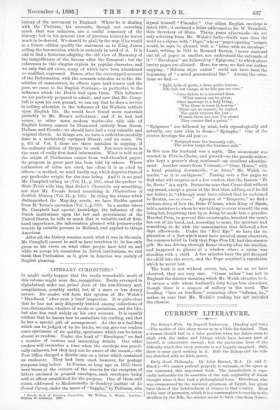LITERARY CURIOSITIES.* IT might easily happen that the really remarkable
merit of this volume might miss due.recognition. Books arranged in alphabetical order are prima facie of the non-literary sort, compilations, possibly useful, but of a more or less dreary nature. No reader will form this opinion of Mr. Walsh's " Handbook " after even a brief inspection. It is quite clear that he has not only diligently hunted among collections of ana, dictionaries, whether of words or quotations, and the like, but also has read widely on his own account. It is equally evident that he knows how to assimilate his reading, and that he has a special gift of arrangement. As this is a building which can be judged of by its bricks, we can give our readers some specimens of its quality, specimens which can be taken almost at random. Under the head of "Envelopes," we find a number of curious and interesting details. Our older readers will remember a time when the envelope was practi- cally unknown, but they may not be aware of the reason,—the Post Office charged a double rate on a letter which contained an enclosure. They had been used, however, for postage purposes long before. In France, as long ago as 1653, there were boxes at the corners of the streets for the reception of letters enclosed in prepaid envelopes, such envelopes being sold at offices established for the purpose. One of these still exists, addressed to Mademoiselle de Soudery (author of Le Grand Cyrus), under the name of " Sappho," by Pellisson, who * Handy Book of Literary Curtovitio 3. By William S. Wolah. London : William W. Gibbing's. 1895. signed himself Pieander." Onr oldest English envelope is dated 1696 ; it enclosed a letter addressed to Sir W. Trumbull, then Secretary of State. Thirty years afterwards—we are only selecting from Mr. Walsh's facts—Swift uses thus the word as a rhyme with " Pope," whose " paper-sparing " temper would, he says, be pleased with a " letter with an envelope." Lamb, writing in 1811 to Bernard Barton, " never enclosed one bit of paper in another, nor understood the rationale of it." " Envelopes" are followed by " Epigrams," to which about twelve pages are allotted. Here, for once, we find our author napping ; " Bifrons atque custos" could not have been the beginning of "a noted grammatical line." Among the selec- tions we find :- " Egli, belle at polite, a deux petits travers Elle fait son visage, et ne fait pas ses vers."
" Cries Sylvia to a reverend dean, What reason can be given, Since marriage is a holy thing, Why there is none in heaven ? ' There are no women,' he replied. She quick returns the jest- ' Women there are, but I'm afraid They cannot find a priest.' "
" Epigrams " are followed by what, both etymologically and actually, are near akin to them—" Epitaphs." One of the stories develops the old jest :- " Resigned unto the heavenly will,
The widow keeps the business still."
In this case the husband was a myth. The monument was erected in Pere-la-Chaise, and proved—so the pseudo-widow, who kept a grocer's shop, confessed—an excellent advertise- ment. Another comes from Vermont,—" Gone Home," with a hand pointing downwards ; " as terse," Mr. Walsh re- marks, "as it is ambiguous." Passing over a few pages we find what will surprise not a few readers, that the famous "Et tu, Brute " is a myth. Suetonius says that Caesar died without any sound, except a groan at the first blow, adding, as if he did not believe it, "although some have related that he exclaimed to Brutus, xxi ov Tb‘yoy." Apropos of "Etiquette," we find a curious story of how the Duke D'Aoste, when King of Spain, told a muleteer to whom he was talking to cover himself, the sun being hot, forgetting that by so doing hoi made him a grandee.
Marshal Prim, to prevent this catastrophe, knocked the man's hat out of hie hand, and, according to some, the muleteer had something to do with the assassination that followed a few days afterwards. Under the "Evil Eye" we have the ex- planation of a fact which must have puzzled many observers, the common belief in Italy that Pope Pius IX. had this sinister gift. He was driving through Rome shortly after his election, and happened to glance at a window where a nurse was standing with a child. A few minutes later the girl dropped the child into the street, and the Pope acquired a reputation which he never lost.
The book is not without errors, but, as far as we have observed, they are very rare. " Grass widow" has not in England the sinister meaning which Mr. Walsh attaches to it. It means a wife whose husband's duty keeps him elsewhere, though there is a soupcon of raillery in the word. The heading, " ince ex lucellum," occurring after " bifrons, &c.," makes us sure that Mr. Walsh's reading has not included the classics.




















































 Previous page
Previous page